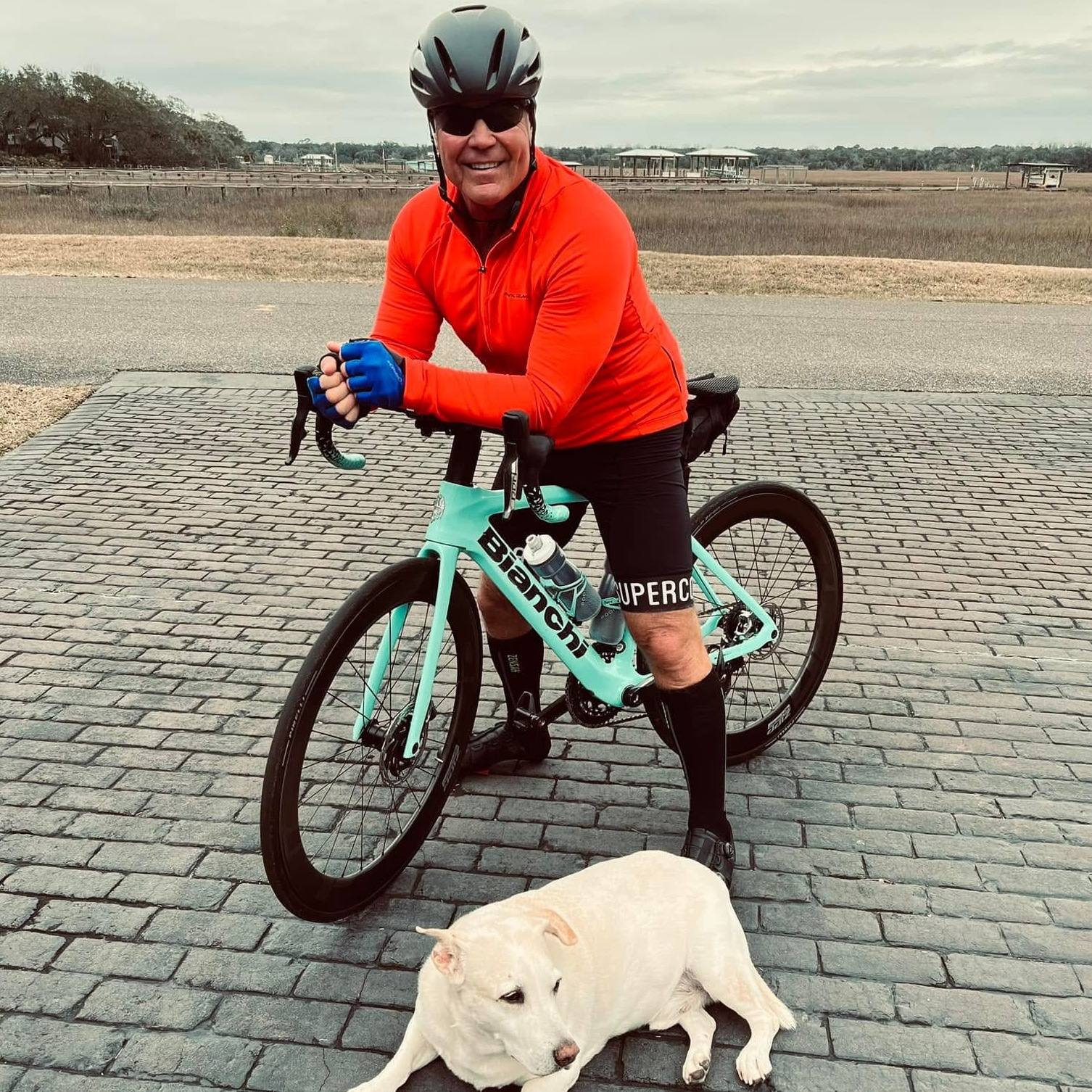A lifetime of food addiction resulted in Jessica Erickson's weight becoming unmanageable. When she looked for medical help, she found a Mayo Clinic team that offered her the care and support she needed to become a smaller, healthier version of herself.
When Jessica Erickson walks up the stairs these days, the only thing she worries about is whether her fitness tracker accurately records all the flights she climbs. It's a dramatic shift from three years ago when Jessica weighed more than 400 pounds and couldn't climb one flight of stairs, much less the 12 she now strives for each day.
After an innovative bariatric surgery at Mayo Clinic in October 2016, Jessica lost more than half her body weight. She now weighs about 168 pounds. But getting to a point where she could achieve that success took a long time. Jessica resisted weight-loss surgery and put it off for years.
"There is a stigma attached to patients who've had bariatric surgery — that it's the easy way out," Jessica says.
It wasn't until Jessica accepted that the surgery was treatment to manage a medical condition that she agreed to the seldom-performed operation known as a biliopancreatic diversion with duodenal switch.
"Bariatric surgery is never a shortcut," says Jessica, who lives in Red Wing, Minnesota. "It's a tool that you're given that will help you in the process. That's all it is. Bariatric surgery provides you with a tool."
Encouraged by a multidisciplinary Mayo care team who supported her through her weight loss, Jessica has lost and kept off 250 pounds for nearly two years.
"Weight is no longer a number for me. It's more about being healthy, and being able to move around and do the things I want to do," Jessica says. "I know, without a doubt, that if I remain healthy, I've got a longer life than I would have before. I honestly believe that these doctors saved my life."
Reaching out for help
Jessica battled obesity her entire life. She tried dozens of weight-loss strategies. On three separate occasions, she lost and gained back 150 pounds. But it wasn't until her weight began preventing her from interacting with others that Jessica decided she needed help.
"I'm a very social person," she says. "I love talking, and I was noticing — particularly at my son's basketball tournaments — that I was always waiting and looking for a place to sit, and not looking at my son's games."
During one game, Jessica had an epiphany. "I thought, 'Is this what I want to do — spend the rest of my life looking for a place to sit down and not engaging with people around me?'"
"At the appointment, [Dr. Radtke] asked me why I was there, and I said, 'I have to do something, or I'm going to die.'"
Jessica Erickson
After that, Jessica met with Jennifer Radtke, M.D., a primary care physician at Mayo Clinic Health System in Red Wing. "At the appointment, she asked me why I was there, and I said, 'I have to do something, or I'm going to die,'" Jessica recalls.
Dr. Radtke agreed that Jessica's weight posed a serious risk to her health. She recommended Jessica visit a specialist at Mayo Clinic's Rochester campus for targeted weight-loss therapy.
In Mayo Clinic's Department of Endocrinology, Jessica met Kurt Kennel, M.D. During their first meeting, Jessica learned she was too heavy to qualify for a sleeve gastrectomy. Sleeve gatrectomies, which accounted for 60 percent of all bariatric procedures performed in the U.S. in 2017, can help patients lose approximately 50 percent of their excess body weight, Dr. Kennel says.
"For Jessica, even if she lost half of her extra weight, she would still have been overweight," Dr. Kennel says.
With a duodenal switch procedure, patients can lose 70 to 80 percent of their excess weight, Dr. Kennel explains. "The switch has always been specialized for certain situations, and typically those are very heavy patients," he says.
During the operation, a patient's stomach is refashioned into a small tube. In addition, a patient's digestive structures are rearranged, so digestive bile from the pancreas doesn't encounter food in the small intestine until the end of the tract. As a result, only a small percent of what a patient eats is absorbed.
Learning she'd require more extreme measures to achieve her goal gave Jessica pause. "I agreed that we would start the 12 weeks of classes required before the surgery, and halfway through it, I would decide," she says.
Changing diet and mindset
In May 2016, when Jessica began the behavioral health education course required before surgery, she altered her diet to better align with the diet she'd need after surgery. She began by reducing carbohydrates — first making small changes and then larger ones.
"I focused on a style of eating better," she says. "I cut back on calories to under 1,000 a day, which is the where I'd need to be if I went through the procedure."
In addition to a change in diet, Jessica began exercising. "I started by walking around the block," she says. "I would go one length and have to stop and rest. I had no strength and endurance. I started doing anything I could do to get in any exercise, even if it was just doing arm circles at the table — anything I could do to try to increase my caloric burn."
By the time Jessica was near the end of her 12-week course, she'd lost 75 pounds. "I was at the point to where people were saying, 'If you've lost that much, you really don't need to have surgery,'" Jessica says. "But it was at that point I was starting to stumble. That's when you start cheating, deciding you don't need to exercise that day."
Jessica had two moments of clarity that convinced her to continue toward surgery. The first was when she noticed she could stand for longer than five minutes. "The second one was a week and a half before my surgery when I realized that I was going to gain that 75 pounds back if I didn't have the surgery," Jessica says. "It was given. I was going down the same path as before, and it was in that realization that I knew I'd made the right decision."
Shifting weight and outlook
Mayo Clinic surgeon Michael Kendrick, M.D., performed the two-phase procedure on Jessica on Oct.18, 2016. The first few weeks after her operation, the weight lost was mainly surgery-acquired water weight. Around Christmas, Jessica's new anatomy began working for her, and she started shedding pounds.
Some weeks she lost three pounds. Other weeks, she lost six. Over the course of a month, 20 pounds might come off. Jessica, who is 5 feet, 8 inches tall, set her goal weight at 185 pounds. In August 2017 — a month she lost 16 pounds — it became clear Jessica needed to slow her weight loss. Jessica began to incorporate more fruit and the occasional sweet treat into her diet. In September, she lost eight pounds. By the October anniversary of her surgery, she was at her goal weight. Since reaching her goal weight, Jessica has increased her daily caloric intake to about 2,000.
Although Jessica had lost nearly 250 pounds of fat, she continued to struggle with the effects of her obesity. In spring 2018, she had surgery, performed by Mayo Clinic plastic surgeon Basel Sharaf, M.D., D.D.S., to remove excess skin from her abdomen and breasts. An additional surgery to remove excess skin under her arms is planned, as well.
"This whole process is about healing me, making me healthier and making me more of the person who I am."
Jessica Erickson
For most patients undergoing this transformation, plastic surgery is an important part of the process, Dr. Sharaf says. "The excess skin can have implications for their health, due to skin infections or interference with their activities of daily living, exercising and staying healthy."
What's more, the negative body image held by many patients after weight-loss surgery can have psychological implications on their overall well-being. Improving that self-image is an integral component of the patient's journey to physical and mental health, Dr. Sharaf adds.
"This whole process is about healing me, making me healthier and making me more of the person who I am," Jessica says. "Dr. Sharaf is helping me become the 'me' that I've been waiting for years to be."
 Realizing goals and reaping rewards
Realizing goals and reaping rewards
Despite reaching her goal weight, Jessica still has moments when she loses touch with her current appearance. "When you lose a lot of weight, it's hard to really understand where you are in size in relation to the rest of the world," Jessica says. "Body dysmorphia is when you brain doesn't allow you to see how you really are. My brain has not completely adjusted, but I am much better than I was."
From the start of her process, it was clear to Dr. Kennel that Jessica was fully committed to losing the weight.
"She was a person who had a goal in mind and very much wanted to do it the right way," he says. "She was fully embracing the process — and it can be a long process. Even before surgery, she was showing herself to be capable and committed, and doing things that make you think, 'Yeah, this person is probably going to do very well.'"
In addition to being lighter, Jessica's weight loss has resulted in the resolution of weight-related health issues such as high blood pressure, high cholesterol and high blood sugar. Jessica's sleep apnea also disappeared.
The appreciation Jessica has for the medical team that supported and facilitated her new appearance, good health and fresh outlook cannot be overstated, she says.
"Never did I feel in any way like I was being judged in a harsh way," Jessica says. "They have always been there to answer questions and be helpful, and encourage and point me in the right direction. It's such an inspiration for me to see them changing people's lives. Not just mine, but so many people out there. I'm just incredibly grateful for everyone out there."
HELPFUL LINKS
- Learn more about bariatric surgery.
- Visit the Department of Endocrinology.
- Connect with others talking about healthy living on Mayo Clinic Connect
- Explore Mayo Clinic.
- Request an appointment.
Related Articles








